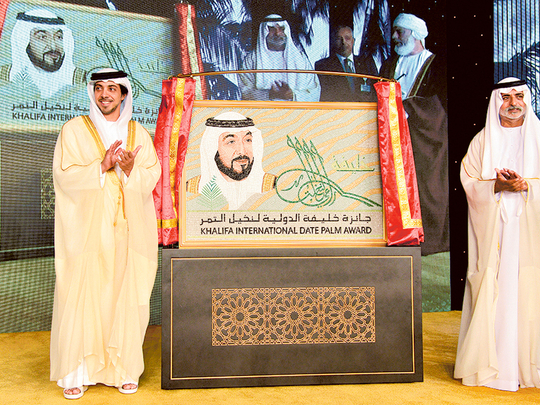
Abu Dhabi: The winners of the seventh edition of the Khalifa International Date Palm Award were honoured and their efforts to boost scientific research on date palms lauded during a felicitation ceremony.
The seventh edition of the Khalifa International Date Palm Award involved its biggest field yet, with 23 countries involved, 16 of them being Arab nations.
The awards featured 134 research projects and studies under several categories.
The objective of the award is to encourage scientific research and development related to the date palm industry, as well as efforts to educate people about cultural aspects of date palm conservation, which is an important aspect of Emirati society.
Shaikh Mansour Bin Zayed Al Nahyan, Deputy Prime Minister and Minister of Presidential Affairs, attended the ceremony and presented the awards to the winners. Entries that took first place received Dh300,000 each while runners-up received Dh200,000 each.
Speaking on the occasion, Shaikh Nahyan Bin Mubarak Al Nahyan, Minister of Culture, Youth and Community Development and president of board of trustees for the award, highlighted the importance of the award. “The blessed palm tree has a prestigious position in the life of the Emirates — and even the whole area. It represents for all of us a rich cultural heritage and has been an important nutritional and economic resource.”
Shaikh Nahyan said the award was an expression of the keenness of the UAE to preserve date palms for all that they meant while also encouraging new studies, research and modern techniques for advancement of date palm farming, improving its cultivation methods, processing and marketing of its fruits to ensure it enjoyed its “rightful place worldwide.”
Gulf News spoke with one of the winners of the award, Professor Michael Purugganan, from NYU Abu Dhabi, who won first place in the distinguished research category.
He said: “What we did is that we sequenced the genome of 62 varieties of date palm, from North Africa, the Gulf, and Pakistan in order to look at the genetic diversity in date palms throughout the region. That was the central research that we did, we’re going to now provide the date palm community with a catalogue of all of the mutations of date palms so that breeders can use that to breed better varieties. These results will help producers and breeders, it will also help people who are doing tissue culture propagation of date palms.”
— The writer is a trainee at Gulf News.










